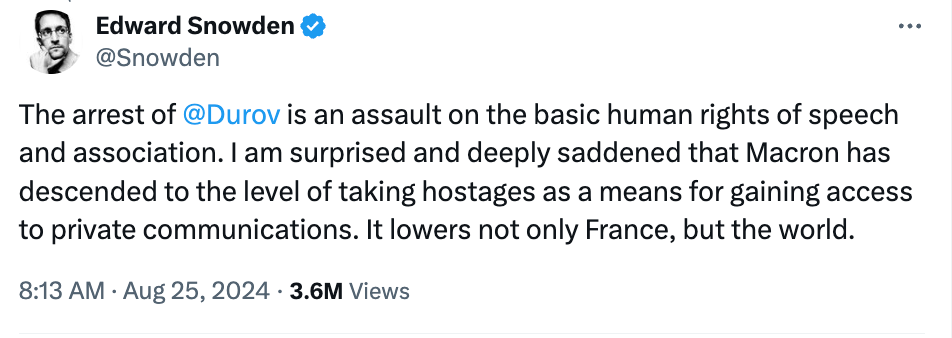FBI arrests Nigerian ‘tech queen’ Sapphire Egemasi in $1.3M heist targeting U.S. government
06/05/2025 - Updated On 06/17/2025
Pavel Durov, the founder and CEO of the popular messaging platform Telegram, has been released from custody in France after being charged with a series of criminal offenses related to his role at the company. The release, which came after a court appearance on August 28, has sparked significant controversy and raised questions about the legal responsibilities of tech executives.
According to an August 28 Bloomberg report, French prosecutors have charged Durov with several criminal offenses, including complicity with illegal activities, refusal to communicate with authorities, money laundering, criminal association, and providing cryptology services without prior declaration. These charges have placed the Telegram founder Pavel Durov Released and under strict judicial supervision, barring him from leaving France and requiring him to post a bail of 5 million euros (approximately $5.5 million) to secure his release.
The saga began on August 24, when Pavel Durov was detained by French authorities at an airport north of Paris. His arrest was part of a judicial investigation that had been ongoing since July, with the details of the case initially kept under wraps. Durov’s detention was extended several times, leading up to his court appearance on August 28, when he was finally released from custody under stringent conditions.
A widely-shared video from Russian state-owned news outlet RIA Novosti captured the moment when Telegram Founder Pavel Durov released from the Paris courthouse, showing him walking free amidst a crowd of reporters. The footage quickly circulated online, sparking debates about the implications of the charges and the broader issues surrounding online privacy and the responsibilities of tech companies.
French prosecutors have accused Telegram Founder Pavel Durov of being complicit in facilitating illegal activities through Telegram, a platform known for its strong encryption and privacy features. Among the most serious allegations are claims that Durov allowed Telegram to be used for the distribution of child pornography and other illicit activities. These accusations have added a significant layer of complexity to the case, drawing widespread attention and criticism.

In addition to the French charges, Durov reportedly faces child abuse allegations in Switzerland, although these are said to be unrelated to the current case in France. The international scope of the allegations has heightened the stakes for Durov and raised questions about the potential consequences for Telegram and its millions of users.
The arrest and subsequent release of Telegram Founder Pavel Durov have ignited a heated debate over free speech, privacy, and the role of tech companies in regulating content on their platforms. Many of Durov’s supporters argue that the charges against him are an attack on freedom of expression, a principle that Durov has long championed. They contend that holding Durov accountable for the actions of Telegram users sets a dangerous precedent that could have far-reaching implications for other tech leaders, including those at companies like Meta and X (formerly Twitter).
Durov’s defenders point out that Telegram’s encryption technology, designed to protect user privacy, is being unfairly targeted by authorities. They argue that while the platform may have been used by bad actors, the responsibility for these actions should not fall on Durov, who has consistently advocated for the protection of personal privacy in the digital age.
French President Emmanuel Macron has denied allegations that the arrest of Telegram Founder Pavel Durov was politically motivated, asserting that the charges are based on legitimate legal concerns. However, many observers remain skeptical, questioning the timing of the arrest and the severity of the charges. The case has highlighted the challenges faced by governments in balancing the need for security and law enforcement with the protection of individual rights and freedoms.

The French government’s actions have also raised concerns about the future of encrypted communication platforms like Telegram. As governments around the world grapple with the challenges of regulating online content, the case against Durov could set a precedent for how tech companies are held accountable for the activities that occur on their platforms.
As the legal proceedings against Telegram Founder Pavel Durov continue, the future of both Durov and the company he founded remains uncertain. With more than 900 million monthly active users as of 2024, Telegram is one of the world’s most widely used messaging platforms. However, the current legal challenges could force Durov to reconsider his approach to privacy and encryption, particularly in light of the serious allegations against him.
For now, Durov remains in France, unable to leave the country as he prepares to face the charges against him. The coming weeks and months will be crucial in determining the outcome of this high-profile case and its impact on the broader tech industry. As the world watches closely, the case of Telegram Founder Pavel Durov released from custody will likely continue to dominate headlines, raising important questions about the balance between privacy, security, and the rule of law in the digital age.
Get more from The Bit Gazette